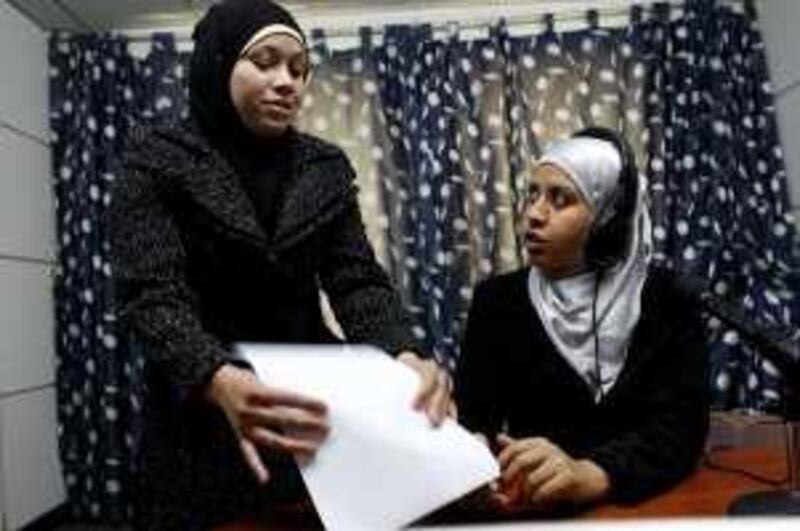AMMAN // For the past year, Muneera Shatti and Asma Raja, two young women from the Jordan Valley, have broadcast a weekly radio show that tackles the issues faced by their impoverished community, from a lack of buses and the theft of water, to boys using mobile phones to take photos of schoolgirls. The work is not without challenges as the tribal-dominated valley on which they report is staunchly conservative and one of 20 pockets of poverty where the average income is about US$1,800 (Dh6,624) per year.
"At first there were men who refused to be interviewed by us. They would say, 'You are women'. But they got used to us. Just last week I interviewed young men in a cafe to gauge their views regarding public services," Ms Shatti said. "Interviewing men is something I would have never imagined myself doing before I became a correspondent for the radio." In one programme, Ms Shatti reported on the lack of buses connecting her town with a nearby village. Within a week, the Jordan Valley Authority responded and provided the needed bus.
"That was encouraging even though later the bus was taken away as other bus drivers protested that it was affecting their business." In another broadcast, Ms Raja, 24, reported on water theft. "Farmers were stealing water from the main pipes, depriving residents of drinking water. I talked to a senior water official who promised to provide citizens with another source of water while the government closed some of the pipes to try to stop those from stealing. Since then, water theft has declined."
Because the women do not have a licence to broadcast in their community, Radio Al Balad, an Amman-based community radio, produces and hosts their show, called the Voice of the Valley. The women take three buses to get to Amman to broadcast the show, but for them, the trip is worth it. Radio Al Balad has been pushing hard to get a licence to launch the first all-women community radio in Jordan. But last month, the government turned down the licence application without giving a reason. The country's laws do not oblige the government to explain why it rejects applications.
The decision, however, has frustrated Daoud Kuttab, the founder of Radio Al Balad, who has been trying to launch Zaharat Alghor, the Flower of the Valley, which would not broadcast news or political programmes. "We were excited. It is a station run by women. It was supposed to be a women empowerment station. We were already seeing success in the one-hour programme," he said. "If the government did not want to give us a licence, then why entertain our application in the first place? It took us a year and a half to fulfil the requirements of the application, including paying $15,000 for the initiation licence fee. We rented offices [in the Jordan Valley], too."
In 2002, Jordan liberalised its airwaves and a year later created an audiovisual commission tasked with licensing independent satellite and radio stations. Since then, 26 independent stations have been granted licences, most of whom provide music, entertainment and social programmes. Seven have licences for news and political programmes. It is 50 per cent more expensive to get a licence for a news and political broadcast because, according to insiders, the AVC believes the latter generates more advertisements, while sceptics see it as another restriction on media freedom.
It is the second time in two years that the government has rejected an application by Mr Kuttab for a community radio licence, raising some speculation that the decision was motivated by personal reasons. Conservative officials are concerned that community radio in a traditional society could create problems among tribes and upset their social and cultural values. Mr Kuttab has also been criticised for allowing Palestinian refugees from Gaza to make their plea for citizenship on his radio programmes. Jordan sees such a policy as serving the interest of Israel because the refugees would then no longer be able to apply to return to Israel.
Because Radio Al Balad is licensed to broadcast only in Amman, residents in the Jordan Valley can only hear the programme by tuning into Al Qamr radio station in Jericho, a West Bank city on the other side of the Jordan Valley. Mr Kuttab had signed an agreement with Al Qamr to rebroadcast the show until he was able to obtain a licence. The programme can also be heard online, but only 16 per cent of Jordanian households have internet access.
Mr Kuttab has made it clear in editorials and blogs that he is not happy with the AVC's decision. But Hussein Bani Hani, the AVC head, argued the government had acted in the interest of investors. "The government wants to give a chance for every investor. We want to give equal opportunities to all," he said. "All the governorates are covered with radio stations, and we have community stations in several universities that also provide training for university students on media broadcasting.
"The stations tackle different subjects in different communities and broadcast social programmes which vary from women and child issues to youth issues. They are funded by organisations involved in media development." Although the community radio stations have been welcomed in most areas, there are some criticism that they are not completely independent. Ms Shatti and Ms Raja were discouraged at first by the government's decision not to grant them a licence. They closed the offices that Radio Al Balad had rented for them last week. But the women said they will continue to broadcast from Amman.
"I will not let the licence get me down. I will continue to work to make the voices of people in remote areas heard," Ms Raja said. smaayeh@thenational.ae





